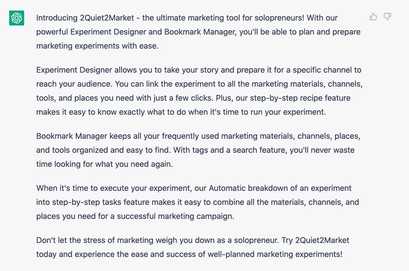Why a regular, introverted Solopreneur needs a new Mindset before they can market their product
Built a lot but made no money! – that is a trigger for change.
Published:

I don't know where you come from, my "home skill" is software engineering. I know how to code, how to make it work in the Internet, and how to release it to the world so everyone can use it.
Building systems was my comfort zone. Sometimes it was difficult, but I could always find a solution for a technical problem.
Until I couldn't.
Status quo: "Building is easy"
That happened at the time I decided to become a solopreneur, i.e. a one-person software development company. One startup after another: When one didn't work, I stopped and started the next one.
The common pattern was: I build, I tell people about it, and I hope people will be excited and will buy my stuff. That was an easy job for me.
Shock: "Nobody buys my stuff"
After the 5th startup, I had to admit: "Hey, this is not going to work. Nobody (well, almost nobody) buys my stuff."
At least, the startups I built didn't grow. Word of mouth didn't kick in, I had to spend my entire day on Twitter to get more eyeballs, but each one of my startups was "default dead", not "default alive" (as Paul Graham would say).
Chaos: Resistance, followed by a lot of ideas
Well, it was not that I was stupid: I knew that If you build it, they will come was a myth from a movie.
The next step was: I bought a lot of online courses that would "make me sell more". Words like "lead magnet", "autoresponder", "tripwire offer", "indoctrination sequence", "sales page", "ascension sequence" and other silver bullet ideas filled up my head.
I thought: If I only follow the frameworks of established marketers, I will have as much success as they have.
What I didn't realize were these things:
- I was merely imitating what the "masters" did.
- What the "masters" do works for them, but not for everyone.
- I had zero mental model about what marketing truly was.
Taking action: Making marketing work for an introvert
The "nobody buys my stuff" effect forced me to stop and change my mind.
Before I went on, I wanted to know:
- What is marketing exactly?
- What can marketing mean for an introverted solopreneur like me?
- Are there sustainable practices that I would be able to use without losing energy?
- Can anything stop me from switching mindlessly from one tactic to the next?
Fortunately, I have a mathematical background and strong analytical skills. I decided to break the "black magic of marketing" down into first principles that are easy to understand. I wanted to have building blocks where I could say: "Ah, now I know how and why each of them works (or does not)!"
The advantage of going back to first principles thinking is: Once you understand a principle, you can apply it in different situations, and to different people, e.g. to yourself instead of a "master marketer".
It's like playing an instrument: If you can play "Let it be" on the guitar, that is already something. But it doesn't mean you can play another song as well, let alone compose your own song!
You need to understand the major and minor scales, chord progressions, rhythm, and so on. Suddenly, you're able to make your first own song!
So that's what I did: Learn the basics of marketing so that I can rearrange and reapply them.
New status quo: "I build and market. People trust me and buy."
This subheading sounds as if I was there. No, I'm not. Not yet. But I'm getting there.
Now that I have the building blocks, I'm on the way to create a marketing habit. I position my product, write some copy about it, publish that copy to my audience and measure their feedback:
- Do they look at my stuff at all?
- Are they interested and join my email list?
- Do they download my free stuff?
- Do they sign up and use my software?
- Finally: Do they trust me enough to become paying customers?
And I do this regularly now, and I dare even say: I enjoy doing marketing (something I couldn't imagine would be true one day).
Changing the way you look at marketing
So, why didn't this work before, and suddenly it did? Something must have been different in the old days.
Turns out, this was for two reasons: one big misconception and one limiting belief. Together, they were strong enough to keep me from being successful.
Here's what I got wrong:
Misconception: Marketing = "pound the drum" + "toot the horn"
The way I thought about marketing was:
You have to make a lot of noise to be heard. Pounding the drum and tooting the horn. Sending a lot of "buy my stuff" messages into the world.
But: This kind of self-promotion felt odd and awkward, because I am a modest and fact-based person.
"Buy my stuff" should work? Nothing could the further from the truth. But that was my thinking back then.

One day, I came across Corey Haines' article Marketing is Earning Trust at Scale. And this phrase "earning trust at scale" opened my eyes:
It's not about what I have to sell, it's about what problems people need to solve, and about the transformation they are seeking: From "now" to "better".
So, if I can…
a) find such people b) understand what they need c) create something that helps them d) earn their trust by "good marketing"
then, only then, a sale would become totally natural.
At first, that sounds more complicated than blasting out "Buy my stuff", right?
But actually, it made everything much easier for me. Writing marketing messages no longer felt like bragging or "tooting my own horn".
Marketing suddenly felt natural, like … helping people to see that I understand their problems and that I got a solution for them. In essence:
👉 It's not me who is great. It's them who will become great when using my stuff.
I don't need to brag or make noise to be successful.
Doesn't that feel totally different? It suddenly made it possible for me (as an introvert) to do marketing. Because it began to feel like actually helping people instead of persuading them.
Wow. Problem 1 was solved. 😄
Limiting belief: "I can't write engaging copy"
That was a big step forward. But one thing was still holding me back:
As an engineer, I was trained to write with a boring, factual style. Almost as in mathematics where you write like this:
- Let's define what X means
- Make an assertion about X
- Prove that assertion
That's dry, isn't it?
Same thing in computer science. Either a program works or it doesn't. And if it doesn't, you fix it. Then it works.
Compare this to marketing: If marketing means "earning the trust of a lot of people" then: What can be more difficult for an engineer? 😳 Humans are so unpredictable!
Look at the stock exchange, for example:
- Company X releases good news, but stocks go down.
- Company Y says they needed to cut 20% of their staff, but stocks go up! What the heck?
You can't "fix" people. (Nope, people are not "code running on a machine called brain".)
When some marketing copy doesn't work, you need to write new copy and test it again.
"Wait, Matthias" (I hear you say), are you going to tell me there is no "root cause" why some copy doesn't work and some other copy does?
Now came a real biggie for me.
First, I learned copywriting, to some extent. But I wasn't good at it. Again: No mental model behind it, I had no idea why some copy works and some does not.
So just when I thought I had to study Eugene Schwartz and other masters of copywriting, and thought I had to go down another rabbit hole and spend half a year in it,
wow 👀, something totally different happened: GPT-3 and ChatGPT came out.
Suddenly, I had a "junior assistant copywriter". I only needed to write in my usual dry, factual, bland style. Then, hand it over to ChatGPT and ask it to give it one or two of these properties:
- engaging
- inspiring
- entertaining
- educational
- shorter, more concise
- longer, more elaborate
Now THIS is copywriter's paradise, isn't it? 😄 Here's an excerpt:

Suddenly, my other skill as an introvert could take over and solve the problem of bad marketing copy:
- As an introvert, I can smell "sleazy", "salesy" or other forms of bad content from a mile away. Nothing could be easier.
So, to write good marketing copy, now I simply do this:
- write boring, factual copy
- put it into ChatGPT to make it engaging
- read it while listening to my emotions
- when it comes out wrong, feels bad or incorrect, I fix it
- then, send it to my audience and see what happens
- get feedback and make the copy better
- learn and improve my skills
Suddenly, this makes total sense, right? It's even fun because when I don't like what I see, I simply ask for more and different copy. ChatGPT never ever gets tired. And it never ever loses confidence, as a human assistant would do.
Yep, problem 2 was solved! 😄
Create a marketing habit for a modest person
Okay, mindset changed, limiting beliefs erased! Time to move forward, integrate what I learned and go "up and to the right" with it, right?
Well, it turned out that mindset wasn't the only thing.
I had more problems to solve, but those were problems I knew well, and I had the skills to do that:
- No structure in my marketing material and process
- No marketing rhythm, just "do it when you feel like it"
- No regular marketing habit, so people forgot about what I had to offer
In another issue, I will talk about establishing a structure for your marketing, finding rhythms to do it, find reinforcement and support – and finally, how to form your own marketing habit to achieve your marketing goals.
Stay tuned, there's a lot of good stuff coming up!
Comments welcome: